KCS introduces UNI-PASS, AEO systems
Commissioner Nak-Hoe Kim of the Korea Customs Service hosted a reception at the Grand Hyatt Seoul on Jan. 26, 2015 to mark the 33rd International Customs Day on the theme of “Coordinated Border Management.” It was attended with an estimated total of over 170 distinguished guests from all segments of Korean society and the international community, including ambassadors and other senior members of the Diplomatic Corps.
The celebration meeting was obviously designed to expand the range of exposure of the activities of the KCS to the international community, especially the Diplomatic Corps, whereas there were video and other public relations materials in English and other foreign languages for more comfortable understanding by the international guests. They included the showing of a video on UNI-PASS, exhibition of photographs and distribution of pamphlets on UNI-PASS and AEO (Authorized Economic Operator).
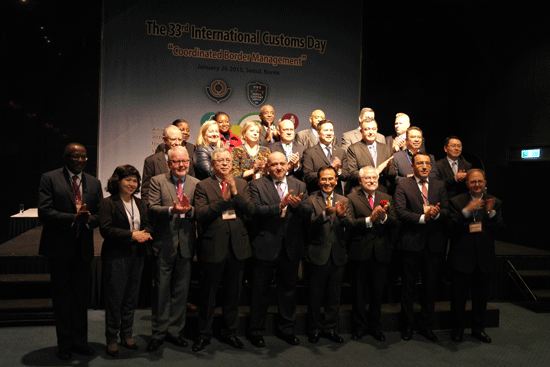
The distinguished guests invited to attend the luncheon reception from the Korean side included Executive Vice President Pi Jae-ki of Korea Customs Brokers Association, Chairman Kim Jong-ho of the Korea Customs Logistics Association, President Lee Hong-kyun of Korea Duty Free Shoppers Association, President Pak Man-suk of Korea AEO Association, President In-sun Cho of Ray Earth Co., Ltd. and President Ms. Annette Jean of MBC PlaybeKidzania.
From the Diplomatic Corps came many mission chiefs and other senior members, who included (in alphabetical order) Ambassadors Ramzi Teymurov of Azerbaijan, Guadalupe Palomeque de Taboada of Bolivia, Petar Andonov of Bulgaria, Hernan Brantes Glavic of Chile, Tomasz Kozlowski of Delegation of the Europan Union, Omar Al Nahar of Jordan, Torbjorn Holthe of Norway, Jaime Antonio Pomareda of Peru, Raul S. Hernandez of the Philippines, Emma-Francoise Isumbingabo of Rwanda, Omrie Michael Golley of Sierra Leone, Hernani Filomena Coelho Da Silva of Timor Leste, Alba Florio Legnani of Uruguay and Somlith Khantivong of Laos (CDA). There also Deputy Head of Mission and Counsellor Faith C.M. Kangwa of Zambia.
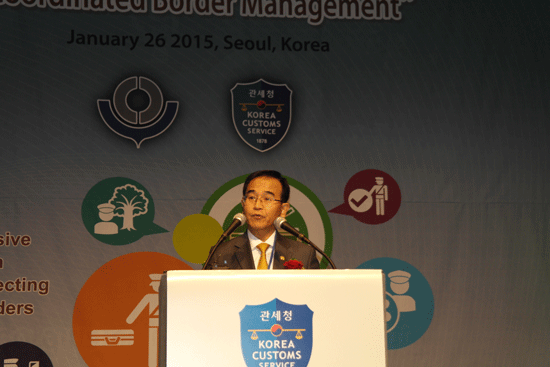
The international guests other than the diplomats included UNC/CFC/USFK Provost Marshal Col. Laurence C. Lobdell and Financial-Economic Police Attache Col. Massimo Grilloa of the Italian Embassy in Seoul.
Speaking to the meeting, Commissioner Kim disclosed that the International Customs Day was proposed by Korea at the World Customs Organization (WCO) Council session and that, with the adoption of the proposal, the Day has been globally commemorated each year since 1983 on January 26, which is the foundation day of the WCO.
Then he said: “Through cooperation with import/export related agencies, the KCS has established and is operating the Single Window system. In its e-clearance system UNI-PASS, the KCS built the Single Window system, which processes all import/export related declarations at one stop.” (See excerpts from the speech at the end of this Article.)
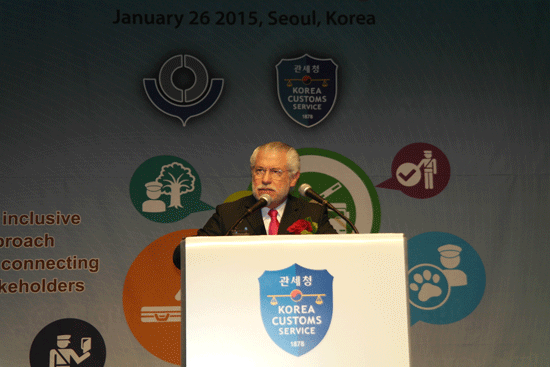
Commissioner Kim’s speech was responded to by a congratulatory address by Ambassador Hernan Brantes of Chile in Seoul.
He said, in part: “We the embassies have noticed the technological and management policies adopted by the Korea Customs Service to meet constantly increasing levels of trade and the necessity for greater cooperation between customs agencies. Many countries, as my own, have already been operating the Single Window System, or we have the possibility that Korea is offering us to adopt the Korea Authorized Economic Operator Program (AEO), as an effective way to save time and logistic costs.” For further details, see excerpts from the speech below:
Excerpts from the congratulatory speech of Ambassador Brantes of Chile:
First let me thank for this invitation to deliver a congratulatory message on behalf of all invited guests, in the celebration of the 33rd anniversary of International Custom Day, hosted by the “Korea Customs Service”.
In order to emphasize the meaning of this celebration, let me highlight that Embassies and Customs Services share the mission of protecting and securing own borders. In addition, we have common spaces in statistical systems, in the use of the Harmonized Nomenclature System and many issues on international trade.
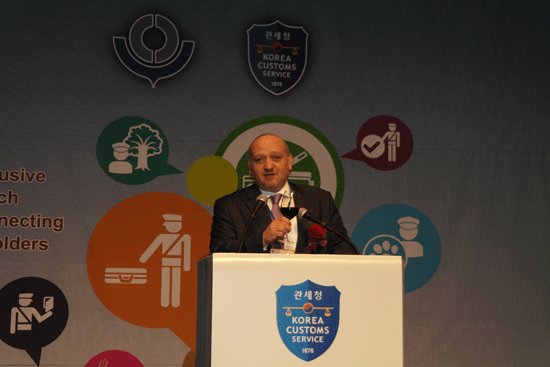
In fact, in terms of international trade, Customs Services are the first contact that foreign products face when arriving to a country, and Customs are by definition the first entity in charge of implementing trade agreements signed between countries, which in turn were accomplished through diplomatic negotiations.
In this regard, we the embassies have noticed those technological and management policies adopted by "Korea Customs Service", to meet constantly increasing levels of trade and the necessity for greater cooperation between customs agencies. I must stand out that many countries as my own, have already been operating the Single Window System, or we have the possibility that Korea is offering us to adopt the Korea Authorized Economic Operator Program (AEO), as an effective way to save time and logistic costs.
I conclude my words noting that any program or willingness to facilitate trade is most welcome. So in order to complete and fulfill the task I have been entrusted, let me express on behalf of all guests our warmest congratulations to "Korea Customs Service", not only for its highest efficiency, as we can appreciate permanently, but also for their ongoing collaborative approach and positive attitude to resolve difficulties when they have emerged.
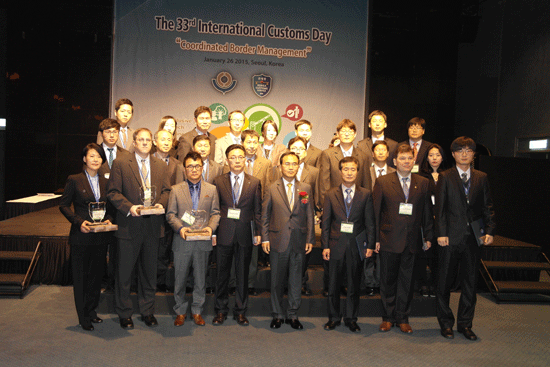
Excerpts from the speech of Commission Kim of KCS:
I am grateful for your presence at the commemoration ceremony of the 33rd International Customs Day despite your busy schedule.
International Customs Day was proposed by Korea at the World Customs Organization (WCO) Council session. With the adoption of the proposal, it has been globally commemorated each year since 1983 on January 26, which is the foundation day of the WCO. This event serves as a tool to communicate with personnel from embassies and consulates as well as international businesses and related entities. In this sense, the event is utilized to listen to ideas for improving Korea's trade environment.
Each year, the WCO selects and publishes a theme of the year. This year's theme is “Coordinated Border Management”. Coordinated Border Management (CBM) is to establish speedy and secure trade environment through cooperation among all import/export related stakeholders.
World Trade Organization (WTO) recently reported that global trade amounted to
36 trillion US dollars in 2013.Despite the global economic downturn, its annual trade volume increased by 8% on average between 2005 and 2013.
Further, global trade is envisaged to increase more rapidly with expansion of FTAs and surge of e-commerce. Coordinated border management is the most efficient policy to manage exponentially increasing trade volume in expedited and secure manners. In this respect, this year's theme is very meaningful.
The WCO presents the slogan of ‘an inclusive approach for connecting stakeholders ‘under the theme of coordinated border management.
Through this, the WCO intends to encourage harmonized cooperation between border control agencies and import/export businesses in Member countries.
I would like to avail myself of this opportunity to explain about efforts by the Korea Customs Service (KCS) towards coordinated border management in three aspects, which are cooperation with import/export related agencies, cooperation with import/export businesses, and lastly cooperation with other Customs administrations in the world.
First of all, through cooperation with import/export related agencies, The KCS has established and is operating the Single Window system. In its e-clearance system UNI-PASS, the KCS built the Single Window system, which processes all import/export related declarations at one stop.
Currently, 38 agencies related to import/export are linked with the KCSthrough the Single Window system in the UNI-PASS.
By the benefit of operating the Single Window system, citizens no longer need to visit government offices in person.
In addition, as information sharing is expedited among import/export related agencies, it greatly reduces work processing time and logistics cost.
The KCS plans to further expand the scope of participating agencies in the Single Window system.
Second, through cooperation with import/export companies the KCS adopted and is operating the Authorized Economic Operator (AEO) program.
The AEO program is to certify reliable businesses with high standards in safety management and compliance and to provide benefits including exemption of customs inspection.
Through the AEO program, import/export businesses can save logistics cost, while the Customs can control illegal goods effectively by the selecting and concentrating method. The KCS carries out a range of measures to support for further participation of businesses in the AEO Program.
In addition, Korea concludedAEO Mutual Recognition Arrangements (MRAs) with major trading partners and supports for businesses to enjoy the benefits of AEO in contracting countries as well.
Finally, through cooperation with other Customs administrations in the world, The KCS is expanding information exchange and support for developing countries.
Since Korea joined the WCO in 1968, it has been robustly supporting policies and activities of the WCO. Now, Korea is serving as an Asia/Pacific member in both Finance Committee and Policy Commission of the WCO. The KCS also concluded Agreements on Mutual Assistance in Customs Matters with 29 countries, and is holding Customs Heads meetings with around 60 countries. Through these, the KCS is closely cooperating for exchanging information and resolving clearance difficulties of businesses.
Moreover, in order to support customs modernization and capacity building of developing countries, the KCS is conducting more than 20 capacity building programs each year. Korea also set up an annual fund of 2.6 million US dollars for Customs Cooperation Fund for the purpose of supporting a range of WCO capacity building projects.
The KCS enthusiastically endeavors to listen to foreign businesses in Korea about their difficulties in customs clearance and to resolve the difficulties.
We welcome all your suggestions on clearance difficulties and business activities in Korea, as well as any ideas for advancement in the customs area.

